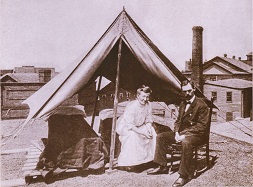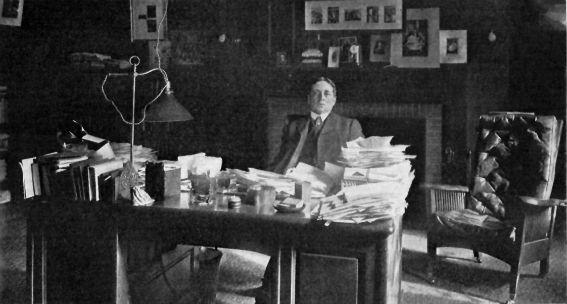Soon after the Rev. Dr. Elwood Worcester became our fourth rector, he agreed to provide space for weekly health-promotion classes for Dr. Joseph Pratt’s tuberculosis patients.

Parents of 3 children. Pictured with their rooftop sleeping tent. They had recovered after attending TB class at Emmanuel in 1907.
Seeing the success of these classes, Worcester, who had a PhD. in psychology, contacted neurologists at Mass. General Hospital about establishing support groups for people suffering from mental distress. They launched their Weekly Health Conferences in 1906 with a series of four lectures by Worcester, McComb, and two physicians. It ended with an invitation to sessions of treatment, healing prayer, and fellowship. When over 200 people showed up the next day, the ministry that was eventually called the Emmanuel Movement was born.
Worcester was fortunate to have as assistant rector the Rev. Dr. Samuel McComb, who became the movement’s publicist. Worcester, Dr. Isador Coriat, and he published Religion and Medicine in 1908, which led to more cooperation between clergy and medical professionals. Articles in the Ladies Home Journal and Good Housekeeping popularized the movement beyond Boston. About that time parishioner Ernest Jacoby started a support group for alcoholic men, which emphasized fellowship as a path to recovery. It met in our basement until 1913, when it moved down Newbury St. to become the Jacoby Club. Paddy Keegan held the first Alcoholics Anonymous meeting in Boston at the Club in 1940.

The Rev. Dr. Elwood Worcester in his study at Emmanuel in 1908. Thanks to the Ladies Home Journal for this image.
Having been helped by Worcester to quit drinking, Courtenay Baylor had joined the Emmanuel staff in 1912. After serving as lay therapist under Worcester’s supervision for over two decades, he estimated that their methods had been successful with about two-thirds of almost a thousand alcoholics. Through his writings and patients Rowland Hazard and Richard R. Peabody, he influenced William Wilson, a founder of Alcoholics Anonymous. Emmanuel is proud to continue this ministry by hosting many 12-step groups.
Further Reading
- Books
- Baylor, Courtenay. Remaking a man: one successful method of mental refitting. NY: Moffat, Yard, 1919 (free full text).
- Dubiel, Richard M. The road to fellowship : the role of the Emmanuel movement and the Jacoby Club in the development of Alcoholics Anonymous. NY: iUniverse, for the Hindsfoot Foundation, 2004.
- Gifford, Sanford. The Emmanuel Movement (Boston, 1904-1929): The origins of group treatment and the assault on lay psychotherapy. Cambridge MA: Harvard University Press, 1997.
- Macomber, William. History of the Emmanuel Movement from the standpoint of a patient. NY: Moffat, Yard, 1908 (free full text).
- Powell, Lyman P. The Emmanuel Movement in a New England town. NY: Charles Scribner’s Sons, 1909 (free full text).
- Runnalls, Claude Bertram. Suggestions for conducting a church class in psycho-therapy. Milwaukee: Young Churchman, 1915 (free full text).
- Worcester, Elwood and Samuel McComb.
- Body, mind, and spirit. NY: Charles Scribner’s Sons, 1932.
- The Christian religion as a healing power: A defense and exposition of the Emmanuel Movement. NY: Moffat, Yard, 1909 (free full text).
- Worcester, Elwood, Samuel McComb and Isador H. Coriat. Religion and medicine: The moral control of nervous disorders. NY: Moffatt,Yard, 1908 (free full text).
- Articles & chapters
- Anonymous (H.) Happiness and health: Results at Emmanuel Church, Good Housekeeping 45(5): 502-508, Nov. 1907.
- Cunningham, Raymond J. The Emmanuel Movement: A variety of American religious experience, American Quarterly 14(1), Spring, 1962: pp. 48-63 (free full text).
- Greene, John Gardiner. The Emmanuel Movement, 1906-1929, The New England Quarterly 7(3): 494-532, Sep. 1934 (free full text). A JSTOR search for “Emmanuel Movement” produces many other articles.
- Hunsberger, Ruth. The American reception of Sigmund Freud. This summary of her 1961 thesis at U Rochester discusses Worcester’s prior exposure to neuropsychology in Germany. http://www.hunsberger.org/freud-america.htm.
- Websites
- Our pages
- Twelve-Step Programs
- Timeline of Emmanuel History: 1904, 1905, 1909 & 1919
- Silkworth’s The Emmanuel Movement has digitized classic articles by Courtenay Baylor, Richard R. Peabody, Francis T. Chambers, Jr. et al.
- Wikipedia’s Emmanuel Movement includes a section on the physicians involved (e.g. Joseph Pratt, who kicked off the Movement by asking Elwood Worcester for help with groups of mostly poor TB patients).
- Our pages
- Archives
- Episcopal Diocese of MA has two boxes of Elwood Worcester’s papers that deal with the Movement, including his lectures to secular audiences.
- Our archive has a collection through 1917 of The Year Book of Emmanuel Parish, Boston. Google Books has digitized these years: 1906, 1908, 1909, 1911, 1912 & 1913. Please contact archivist@emmanuelboston.org for access to other years.
- Memorials
- A wooden plaque attached to our sanctuary’s south wall in 1941 says, “In grateful memory of Elwood Worcester, DD, STD, rector 1904-29; originator of the widely known Emmanuel Movement, learned preacher, physician of souls.”
- The vestibule of our eastern door has a stone plaque dedicating it to Courtenay Baylor, whose friends gave the lanterns inside and outside the doorway in his memory after his death in 1947.

